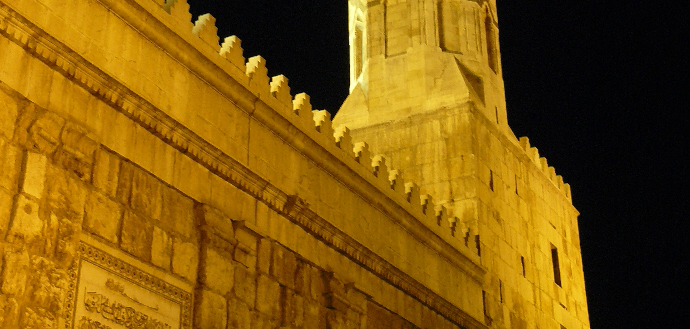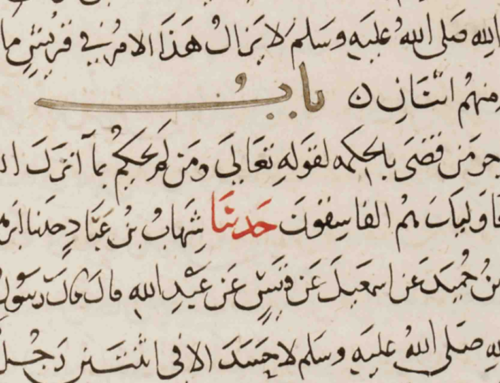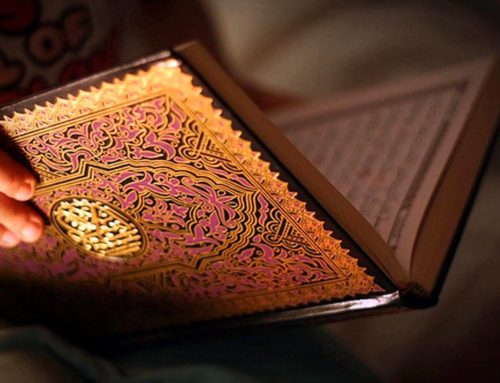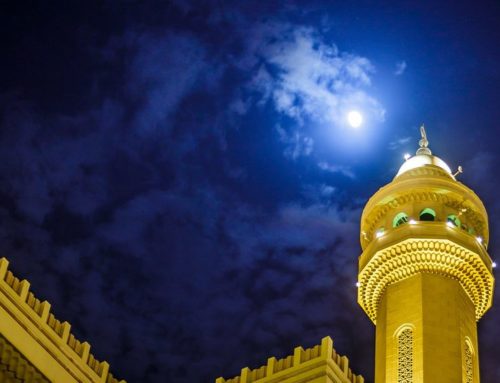Translated by Tameem Ahmadi
Question
These days, in the city of Surat, I have been lecturing on the calling of adhan (call to prayer) over a grave after a burial. The reasoning behind this is that Satan comes to a Muslim at this juncture and that when the deceased person hears the caller to prayer giving the adhan, he answers on account of which Satan flees. The calling of the adhan is also a sunnah and this practice has also been carried out in the graveyards of Seoram-Pura and Hasan-Ji Sahib.
When this issue was put before the ‘ulama of Surat, they answered by encouraging the hymning of Subhanallah, Alhamdu-lillah, and Allahu Akbar. They also mentioned that the fuqaha (jurists) have not mentioned the permissibility of any such practice in their books at any place. Therefore, my question is: Who is correct with regards to this matter? I would be grateful if you would answer this question with references from the reliable books of jurisprudence.
Answer
First of all, it is not established from any authentic hadith that Satan comes in the grave. But, if we do [hypothetically] accept that he does come in the grave, then his coming poses no possibility of harm (or threat), because the ability of misleading others is particular to this world [and not to the realm of barzakh and akhirah (hereafter)] as this world is a source of burden and tribulation. As is mentioned in a hadith: “The living cannot be guaranteed safety from fitnah (trials and tribulations) …” When a person passes away, he cannot be now led astray if he was on guidance and cannot be guided if he was astray. Therefore, prescribing the adhan at this juncture is basing an unsound practice on an unsound [and invalid] proof. [1]بناء الفاسد على الفاسد
Irrespective of this, this would be considered qiyas (analogy) due to the fact that this practice has not been reliably transmitted from the Messenger of Allah (Allah bless him and give him peace) and the Companions (may Allah be pleased with them). Firstly, this is not the place to do qiyas. Secondly, this qiyas is being done by a non-mujtahid (one who is not qualified for this task) because the fuqaha have explicated that after the fourth century of Hijrah, ijtihad (inference) ended. Anyway, due to the absence of any shar‘i proof in this regard, this practice is a reprehensible innovation (bid‘ah). More than just absence of proof in this regard there is also proof of absence here due to the fact that the scholars have explicitly rejected this innovated practice.
As is mentioned in Radd al-Muhtar, in the first section in the chapter regarding the call to prayer, “… and it has been said: it is desirable to give the adhan at the time of lowering the deceased into the grave on the analogy of his (man’s) first coming into the world. But this has been rejected by Ibn Hajar in Sharh al-‘Ubab.”
[An action is even more reprehensible] when it is given extreme importance and overly adhered, and this is such in this case. In the case where people are over-emphasizing what is not to be emphasized, then even a mustahab (preferable) act will become impermissible, just as the fuqaha have explicated in their works and derived other issues on this same principle.
And Allah knows Best.
19th Muharram 1326
Imdad al-Fatawa; 5/301-302
| ↑1 | بناء الفاسد على الفاسد |
|---|







To give Azaan at the grave.
To give Azaan at the grave is Mustahab (desirable) Munkar
and Nakeer (angels) will ask three questions:
1. Who is your lord?
2. What is your religion?
3. What do you say about this person i.e. the Holy Prophet ?
In Nawadirul-Usool, Imam Tirmidhi Muhammad bin Ali narrates from Imame Ajal Suflyan Son Rahmatullahi Alaih’s that when the decease is asked the question “who is your lord?” Then shaitan appears and points at himself and says, “I am your lord” The same way the shaitan provokes a person at the time of death. So that our Imaan is taken away, he reaches the grave and misleads the decease by saying “I am your lord” so that the decease fails in his final test. This is why it has been ordered to make Dua before leaving.
In Muslim and Bukhari, Hazrat Abu Huriarah Radiallahu Anhu Narrates that the Prophet (Sallallahu-alaihi-Wasallam) stated that when the Azaan is given, the shaitan turns his back and runs until the Azaan is not heard. This is why when the three questions are asked; the answers are given inside the Azaan. With the blessing of the Azaan the shaitan objects it and runs, and the deceased will be able to answer the question without difficulty. Because in the Azaan there is the full talqeen and talqeen is proven from the hadith.
‘Who is your Lord?’ In the beginning of Azaan. Allahu Akbar Allahu Akbar. Allahu Akbar Allahu Akbar, Ashhadu Allah illaha and in the end Allahu Akbar Allahu Akbar, Laillaha Illallah is said. The answer to the question of who is your Lord has been though best. When listening to this he will remember that my Lord is Allah.
The answer to the question What is your religion? Hayya-AlasSalah, Hayya-Alal-Falah will lead you to your answer, that my religion was that in which there is Salaah, bow and prostration. In other words Islam.
The answer to What do you say about this person is in Ashhadu Anna Muhammadur-Rasoolullah, that he is the messenger of Allah.
People say that to pray the Azaan at the grave is Bid’at, Shirk, Haraam etc. but they have no proof of it being impermissible. Their only objective is to misguide and nothing else and some say they are blind minded.
It is stated in Durre-Muhktar in the first part (Al-Azaan) that to say the Azaan at ten places is Sunnah
1) For the five times Salaah
2) In a child’s ear
3) When something has caught fire
4) At a battle
5) Behind a traveller (after setting off)
6) When jin becomes visible
7) When one is angry
8) A traveller who has lost his way
9) For one who suffers from epilepsy
10) If the Azaan is said at the grave, with it’s blessing the shaitaan will run.
The deceased will now be in peace and the misleader has ran away and the Azaan will take the fear away from the hearts. There will be no danger and there will be peace of mind. He will (lnshallah) give the correct answers,. because of the blessing of the Azaan there will be no concern and will receive inner peace.
Now those people who want the deceased to fall in the shaitans trap then keep on calling the Azaan impermissible. Those Islamic brother who want the deceased in peace and tranquility then instruct the Azaan in order for the deceased to pass his final test And so make the grave wide. Action are according to intentions.
Assalamu alaykum
I would say that the above argument for the action fails on the merit that the questioning takes place after the people have buried the individual and have walked away from the grave. This would be the time ‘theoretically’ shaitan would come if it was the case as coming before this and giving the reason for giving adhan before this would be void only because the soul would not be present in the body until after the people have departed.
So the above comments do not carry much weight, and even more so because it has no precedence in the schools of jurisprudence. Not that i am aware of anyway except amongst some parts of the indo/pak subcontinent communities.
Also i find a slight hint of sectarianism in the comments
“those people who want the deceased to fall in the shaitans trap”
Its a fiqhi matter so get over it brother!!
@sami
aslaamu alykum.
Once people have buried a dead, and start departing, the dead man listens to the sounds of the shoes of his relatives after they have put him in his grave (Sahih Muslim)
Then two angels come and speak to him.
In Sahih Muslim it is narrated, that after the burial in the grave, and after the mourners have left the burial site, two angels enter the grave and ask the dead person regarding Allah and Muhammad. If he were a non‑Muslim he would be shown his seat in hell fire. Once the angels are satisfied that the corpse is that of a Muslim, they expand the grave of the believer to seventy cubits, and he will be shown his place in paradise.
So this contradicts this…
10) If the Azaan is said at the grave, with it’s blessing the shaitaan will run.
either you are calling Muhammed s.a.w a liar…Na’azubillah…and you are calling your self the truthful.
Obviously you dont. So dont misguide other people.
Jazkallah.
Assalam o ‘alaykum,
Calling ahdan in front of the grave and recite loud zikr in front of a janazah is bid’ah by consensus!
Shaykh Wahbi ibn Sulayman al-Ghawji al-Albani writes:
“He [Shaykh Sa’id Ramadan al-Buti] said: “Perhaps the most restricted definitions of Bid’ah will include in it only that upon which there is consensus on classifying it as Bid’ah. There is the meaning implied by the Qur’an and the Sunnah and this is the definition preferred by Imam al-Shatibi in his book Al-I’tisam which is: “An introduced way in the Din which opposes the Shari’ah and is intended to serve as a means to worship Allah.”
He defined it with another definition which is broader in its implication and with the result some issues about which there is some difference of opinion may be included. We will commence from the first definition trying to spell out the area of disagreement and the area of consensus.
The scholars are unanimous that Bid’ah is Haram (prohibited) and there is no doubt that any way introduced in the name of religion irrespective whether in ‘Aqidah or in acts of worship is certainly Bid’ah. So to introduce another Salat over and above the obligatory and confined voluntary Salat, or to introduce fasting on another specific day without anything reported in the Qur’an or in the Sunnah, or even to confine oneself to one form of food regarding it as an act of devotion, or to raise the voice reciting Qasidah’s and adhkar in front of the Janazah. Or even to call out the adhan in front of the grave. This will include introducing some aspects of belief like assuming that Jahannam will perish and the punishment of the disbelievers will end or even to maintain that their punishment is only one of disgrace. All of this is Bid’ah by consensus and therefore to adopt any of this is a deviation as was explained by the Messenger of Allah.”
http://www.scribd.com/full/37802480?access_key=key-xkoogf4q4hzmpm2aaje133
As’salmu alikkum WRB,
I think those who allow Azan after burial try to equate it with talqeen as suggested by some scholars. Since it is a matter of starting the life in Barzaq people has given much importance to it. However the question that needs to be address is : will a sinful muslim be in his proper senses to pay attention to Azan and remember what he had forgotten all his life in addition to the way the angles come in a scaring appearance in the graves of sinners?.
Perhaps a clarification on talqeen will make things more clear.